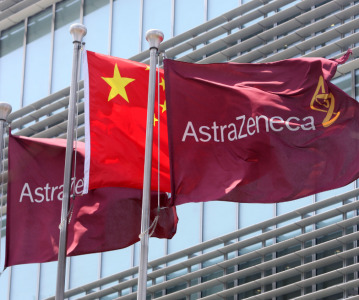Novartis Announces Collaboration with Banner Alzheimer's Institute on a Pioneering Prevention Study for Alzheimer's Disease

Novartis has announced a collaboration with Banner Alzheimer's Institute (BAI) on a pioneering clinical study in Alzheimer's disease (AD) prevention. The study will determine whether two Novartis investigational anti-amyloid treatments can prevent or delay the emergence of symptoms of AD in people identified as being at genetic risk for developing the late-onset form of the disease.
Using an innovative trial design, the two treatments will be given in cognitively healthy people at genetic risk of developing the build-up of amyloid protein in the brain that may eventually lead to AD. One treatment is an active immunotherapy, a treatment that stimulates an immune response, and triggers the production of natural antibodies against amyloid. This investigational treatment, given via an injection, is in Phase II clinical development. The second treatment, a BACE inhibitor, is an oral medication about to enter Phase I trials and is designed to prevent the production of different forms of amyloid.
Early in the course of AD, amyloid build-up in the brain is evident and is thought to be a key factor in driving the subsequent progressive damage and clinical symptoms in AD. The aim of the study is to assess whether these investigational treatments could prevent, slow or delay the loss of memory and other cognitive abilities associated with AD. Current treatments for AD only address the symptoms of the disease.
"We are delighted to announce this collaboration with the Banner Alzheimer's Institute," said David Epstein, Division Head, Novartis Pharmaceuticals. "This trial reinforces Novartis' focus to following the science of the disease and outlines our continued commitment to the study of AD.There is a huge unmet need for treatments that prevent or delay the development of the disease and we are excited about taking research in Alzheimer's to the next level."
The study, which will be run in collaboration with the BAI, will involve more than 1300 cognitively healthy adults, ages 60 to 75, with a genetic risk of developing symptoms of AD because they inherited two genetic copies of the apolipoprotein E epsilon 4 (APOE4) allele — one from each parent. About 2% of the world's population has this genetic profile, which is strongly linked to late-onset AD. Participants in the study will be given either the active immunotherapy, the BACE inhibitor or placebo. Pending regulatory approval, the study is planned to start in 2015 in sites in North America and Europe.
Related News
-
News Google-backed start-up raises US$600 million to support AI drug discovery and design
London-based Isomorphic Labs, an AI-driven drug design and development start-up backed by Google’s AI research lab DeepMind, has raised US$600 million in its first external funding round by Thrive Capital. The funding will provide further power t... -
News AstraZeneca to invest US$2.5 billion in Beijing R&D centre
Amid investigations of former AstraZeneca China head Leon Wang in 2024, AstraZeneca have outlined plans to establish its sixth global strategic R&D centre in China. Their aim is to further advance life sciences in China with major research and manufact... -
News Experimental drug for managing aortic valve stenosis shows promise
The new small molecule drug ataciguat is garnering attention for its potential to manage aortic valve stenosis, which may prevent the need for surgery and significantly improve patient experience. -
News How GLP-1 agonists are reshaping drug delivery innovations
GLP-1 agonist drug products like Ozempic, Wegovy, and Mounjaro have taken the healthcare industry by storm in recent years. Originally conceived as treatment for Type 2 diabetes, the weight-loss effects of these products have taken on unprecedented int... -
News A Day in the Life of a Start-Up Founder and CEO
At CPHI we work to support Start-Up companies in the pharmaceutical industry and recognise the expertise and innovative angles they bring to the field. Through our Start-Up Programme we have gotten to know some of these leaders, and in this Day in the ... -
News Biopharmaceutical manufacturing boost part of new UK government budget
In their national budget announced by the UK Labour Party, biopharmaceutical production and manufacturing are set to receive a significant boost in capital grants through the Life Sciences Innovative Manufacturing Fund (LSIMF). -
News CPHI Podcast Series: The power of proteins in antibody drug development
In the latest episode of the CPHI Podcast Series, Lucy Chard is joined by Thomas Cornell from Abzena to discuss protein engineering for drug design and development. -
News Amgen sues Samsung biologics unit over biosimilar for bone disease
Samsung Bioepis, the biologics unit of Samsung, has been issued a lawsuit brought forth by Amgen over proposed biosimilars of Amgen’s bone drugs Prolia and Xgeva.
Position your company at the heart of the global Pharma industry with a CPHI Online membership
-
Your products and solutions visible to thousands of visitors within the largest Pharma marketplace
-
Generate high-quality, engaged leads for your business, all year round
-
Promote your business as the industry’s thought-leader by hosting your reports, brochures and videos within your profile
-
Your company’s profile boosted at all participating CPHI events
-
An easy-to-use platform with a detailed dashboard showing your leads and performance







.png)